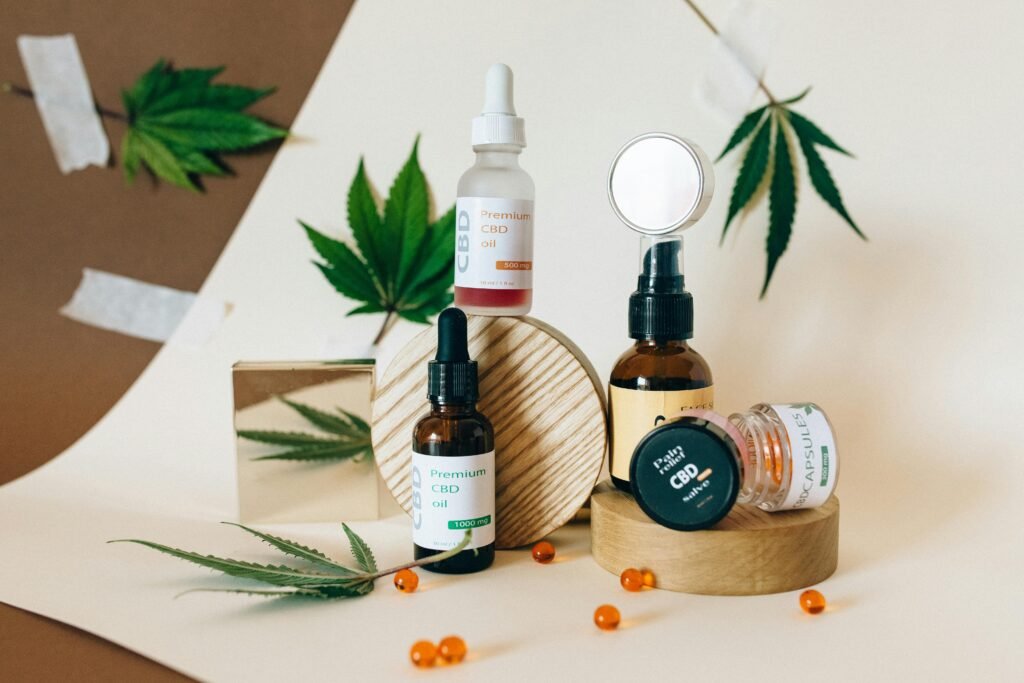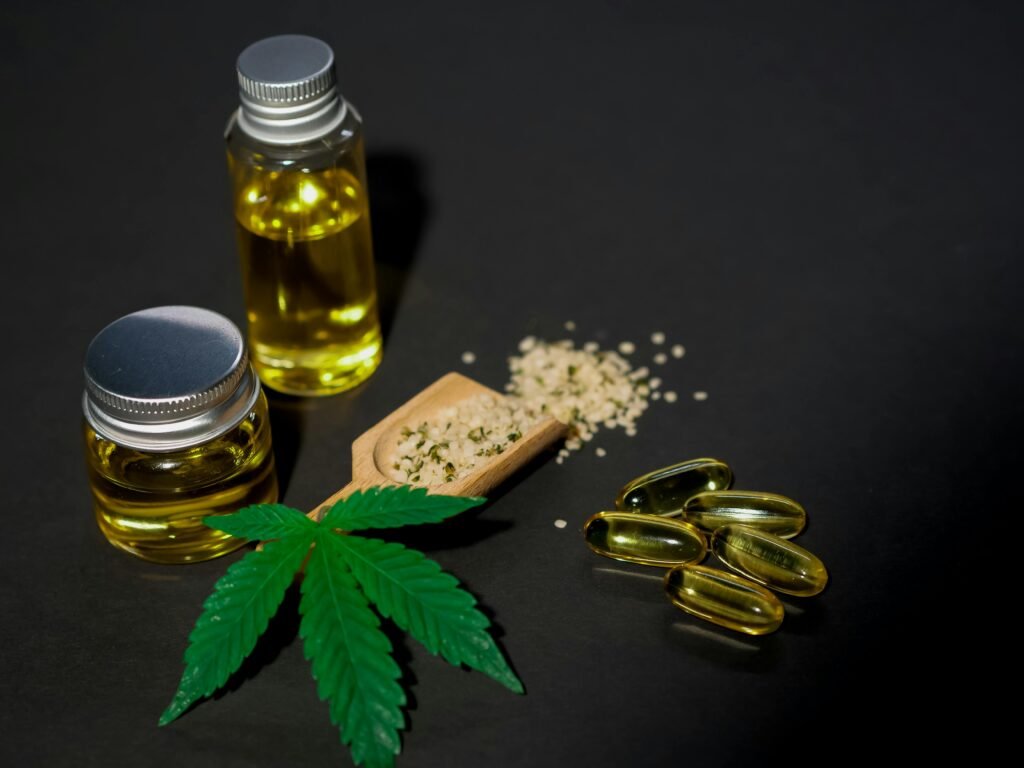
Introduction to CBD Oil and Mental Health
In recent years, interest in CBD oil and its potential benefits for mental health has grown significantly.
Derived from the cannabis plant, CBD is a non-psychoactive compound that has gained attention for its potential to enhance mental well-being without the intoxicating effects associated with THC.
As more people seek natural and holistic approaches to managing mental health conditions, CBD oil has emerged as a potential option worth exploring.
Many individuals are turning to CBD oil for its potential calming effects, which can be particularly beneficial for those struggling with anxiety, depression, and stress.
For those living with anxiety, daily life can feel overwhelming and filled with uncertainty.
CBD oil may offer a way to help manage these feelings, fostering a sense of calm and stability.
Research is ongoing, but early findings suggest that CBD’s interaction with the body’s endocannabinoid system may play a role in regulating mood and stress responses.
Depression is another common mental health challenge that can deeply affect one’s quality of life.
Traditional treatments often involve medication and therapy, but not everyone finds relief with these methods.
Some individuals have reported that incorporating CBD oil into their routines has helped improve their mood and overall sense of well-being.
This has led to a growing interest in how CBD might serve as a complementary option alongside more established treatments.
Stress, an almost ubiquitous part of modern life, can take a significant toll on both the mind and body.
The relaxing properties of CBD oil are thought to help alleviate the physical and emotional strain caused by stress.
By promoting relaxation and reducing tension, CBD oil may offer a natural way to manage the daily pressures that many of us face.
While the potential benefits of CBD oil for mental health are promising, it’s important to approach this option with careful consideration.
The variability in product quality and the need for further research highlight the importance of choosing reputable brands and consulting with healthcare providers.
This ensures that any approach to using CBD oil is tailored to individual needs and circumstances, maximizing its potential benefits while minimizing any risks.
How CBD Oil Affects the Brain

Understanding how CBD oil affects the brain involves exploring its interaction with the endocannabinoid system, a complex network responsible for maintaining balance in the body.
CBD is believed to influence this system, promoting a sense of calm and equilibrium.
By impacting mood and anxiety levels, CBD oil could offer a natural approach to enhancing mental well-being.
The endocannabinoid system comprises receptors located throughout the brain and body, playing a crucial role in regulating mood, memory, and stress responses.
When CBD interacts with these receptors, it may help modulate the production of neurotransmitters, such as serotonin and dopamine, which are essential for mood regulation.
This interaction might explain why some individuals experience relief from symptoms of anxiety and depression when using CBD oil.
Furthermore, CBD’s potential to support brain health extends beyond mood regulation.
Some research suggests that CBD may have neuroprotective properties, which could be beneficial for conditions that involve neuroinflammation and oxidative stress.
By potentially reducing inflammation and protecting brain cells, CBD oil might contribute to overall cognitive health and resilience.
Another fascinating aspect of CBD’s impact on the brain is its potential influence on the hippocampus, a brain region involved in memory formation and emotional regulation.
Animal studies have shown that CBD can promote neurogenesis, the growth of new neurons, in the hippocampus.
This process is particularly important because a healthy hippocampus is associated with better stress management and emotional resilience.
While the scientific community continues to investigate the precise mechanisms through which CBD affects the brain, early findings are promising.
Researchers are particularly interested in CBD’s ability to enhance extinction learning, a process where the brain learns to reduce fear responses to previously threatening stimuli.
This could have significant implications for treating anxiety disorders, as it may help individuals unlearn fear-based responses.
CBD Oil for Anxiety Relief

CBD oil’s potential to alleviate anxiety has been supported by several studies.
Personal anecdotes also highlight how CBD oil has helped individuals manage their anxiety, offering relief where other treatments may have fallen short.
For many, CBD oil has become a valuable tool in their self-improvement and personal growth journeys.
CBD oil works by interacting with the body’s endocannabinoid system, which plays a role in regulating mood and stress responses.
This interaction may help reduce the overactivity of certain neural pathways associated with anxiety, fostering a sense of calm.
For those who experience anxiety in social situations, CBD oil might offer the reassurance needed to navigate these encounters with greater ease.
It’s not uncommon for people to report feeling more grounded and less overwhelmed after incorporating CBD oil into their daily routines.
One of the appealing aspects of CBD oil is its versatility.
It can be taken in various forms, such as tinctures, capsules, or edibles, allowing individuals to choose the method that best suits their lifestyle and preferences.
Some people find that taking a small dose of CBD oil in the morning helps set a positive tone for the day, while others prefer using it in the evening to unwind and relax before bed.
It’s important to remember that everyone’s experience with CBD oil can vary.
Factors such as the specific type of anxiety, individual body chemistry, and the quality of the CBD product all play a role in how effective it may be.
Consulting with a healthcare provider can help determine the appropriate dosage and ensure that it fits well with any other treatments or medications being used.
When exploring CBD oil for anxiety relief, it’s crucial to choose products from reputable brands.
The market is filled with varying levels of quality, and ensuring that you’re using a high-quality product can make a significant difference.
Look for products that have been third-party tested and come with clear labeling about their CBD content and ingredients.
Overall, the growing interest in CBD oil as a natural approach to managing anxiety reflects a broader shift toward seeking holistic and personalized strategies for mental well-being.
While more research is needed, the existing evidence and personal stories suggest that CBD oil holds promise as a supportive tool in the journey toward better mental health.
CBD Oil and Depression Management

Depression, a common mental health condition, may also be positively influenced by CBD oil.
While human studies are still ongoing, there are promising signs that CBD oil could play a role in managing depression symptoms.
Case studies of people using CBD oil for depression often report improved mood and increased well-being, highlighting its potential as part of a comprehensive mental health strategy.
For those grappling with depression, everyday tasks can feel insurmountable, and the overall sense of hopelessness can be overwhelming.
CBD oil’s interaction with the body’s endocannabinoid system may help to regulate mood and emotional responses, potentially alleviating some of the debilitating effects of depression.
Many individuals have shared their personal experiences with CBD oil, noting improvements in their mood and emotional stability.
For some, incorporating CBD oil into their daily routines has provided a much-needed sense of relief, allowing them to reengage with activities they once enjoyed.
This anecdotal evidence supports the potential of CBD oil to act as a supplementary approach to traditional depression treatments.
Another intriguing aspect of CBD oil is its potential to influence serotonin receptors in the brain.
Serotonin is a neurotransmitter that plays a key role in mood regulation, and low levels are often associated with depression.
By potentially enhancing serotonin signaling, CBD oil may contribute to a more balanced and positive mood, offering hope for those who struggle with depressive symptoms.
CBD oil can be taken in various forms, such as tinctures, capsules, and edibles, providing flexibility for individuals to find a method that fits their lifestyle.
Some people find that taking CBD oil in the morning helps them start the day with a clearer mind and a more positive outlook, while others prefer using it in the evening to promote relaxation and better sleep.
It’s important to recognize that while CBD oil shows promise for managing depression, it should not replace conventional treatments prescribed by healthcare providers.
Consulting with a healthcare professional can help determine the appropriate dosage and ensure that CBD oil is used safely alongside other treatments.
Additionally, choosing high-quality CBD products from reputable brands is essential to ensure efficacy and safety.
CBD Oil for Stress Reduction

In today’s fast-paced world, stress has become a common part of daily life for many people.
Whether it’s due to work pressures, personal challenges, or global events, stress can have a significant impact on both mental and physical health.
CBD oil offers a natural option that some people find helpful in managing this stress, potentially making day-to-day life more manageable.
One of the primary ways CBD oil is believed to help reduce stress is through its interaction with the body’s endocannabinoid system, which plays a crucial role in regulating various physiological processes, including mood and stress responses.
By influencing this system, CBD may help promote a sense of calm and relaxation, making it easier to handle the stressors that arise throughout the day.
For those with demanding schedules, incorporating CBD oil into their daily routine can be a simple yet effective strategy.
Some individuals find that adding a few drops of CBD oil to their morning coffee or smoothie helps them start the day with a sense of calm and focus.
Others prefer taking CBD oil in the evening, using it as part of their bedtime routine to unwind and prepare for restful sleep.
This flexibility allows each person to tailor their use of CBD oil to fit their unique lifestyle and needs.
It’s also worth noting that CBD oil comes in various forms, from tinctures to capsules to edibles, providing multiple options for consumption.
This variety makes it easier for individuals to find a method that works best for them.
For instance, those who prefer a quick and easy option might opt for capsules, while those who enjoy a more customizable approach might choose tinctures.
Incorporating CBD oil into relaxation practices can further enhance its stress-relieving effects.
For example, adding CBD oil to a warm bath, using it during a meditation session, or pairing it with a calming activity like reading or yoga can create a holistic approach to stress management.
These practices not only help reduce stress but also contribute to overall well-being and balance.
It’s important to keep in mind that everyone’s experience with CBD oil can differ, and what works for one person may not work for another.
Consulting with a healthcare provider can provide personalized guidance and help ensure that CBD oil is used safely and effectively as part of a stress management plan.
Potential Side Effects and Considerations

While many find CBD oil beneficial, it’s important to be aware of potential side effects and considerations.
For instance, some individuals may experience mild symptoms such as fatigue, dry mouth, or changes in appetite.
It’s worth noting that these effects are typically rare and often depend on the dosage and individual response.
However, it’s crucial to note that the FDA has issued warnings about discrepancies between the claimed and actual content of CBD products.
This highlights the importance of choosing reputable brands to ensure product quality and safety.
When starting CBD oil, consulting with a healthcare provider is highly recommended.
This can help tailor the approach to individual needs and ensure that it fits well with any other treatments or medications being used.
Factors such as the specific mental health condition, individual body chemistry, and the quality of the CBD product all play a role in how effective it may be.
In some cases, CBD may interact with other medications, potentially altering their effects.
For instance, CBD can influence how the body metabolizes certain drugs, which may necessitate adjustments in dosage or close monitoring by a healthcare provider.
Therefore, full disclosure of all medications and supplements being taken is crucial when considering CBD oil as part of a mental health strategy.
Moreover, the market for CBD products is not strictly regulated, leading to variability in product quality.
It is essential to select products that have been third-party tested, with clear labeling about their CBD content and ingredients.
This can help ensure that you’re using a high-quality product that is both effective and safe.
In addition, some individuals may have allergies or sensitivities to certain ingredients in CBD products, such as carrier oils or flavorings.
Reading labels carefully and opting for products with minimal and natural ingredients can help minimize the risk of allergic reactions.
By taking these considerations into account, individuals can make informed decisions about incorporating CBD oil into their mental health regimen, maximizing its potential benefits while minimizing any risks.
Conclusion and Personal Reflection

CBD oil has shown promise in enhancing mental well-being, particularly for those dealing with anxiety, depression, and stress.
The potential benefits are supported by early research and numerous personal experiences, indicating that CBD can be a valuable component in a holistic mental health strategy.
My own experience with CBD oil has been a journey of exploration and learning, shedding light on its role in promoting emotional balance and overall wellness.
One of the most compelling aspects of CBD oil is its versatility.
Whether it’s through tinctures, capsules, or edibles, CBD can be easily incorporated into daily routines, offering flexibility and convenience.
This adaptability makes it a practical option for those seeking to improve their mental health without the complexity of more traditional treatments.
However, it’s important to approach CBD oil with careful consideration.
The variability in product quality means that selecting reputable brands is crucial.
Third-party testing and clear labeling can help ensure that you’re using a safe and effective product.
Consulting with a healthcare provider can provide personalized guidance, helping to tailor the use of CBD oil to your specific needs and circumstances.
My journey with CBD oil has been a thoughtful exploration of its potential benefits.
While it’s not a one-size-fits-all solution, it has contributed to a more balanced approach to managing my mental health.
It has become a part of my daily routine, helping to create a sense of calm and stability in my life.
Incorporating CBD oil into your mental health regimen requires a mindful approach.
Being aware of potential side effects, understanding how it interacts with other medications, and choosing high-quality products are all important steps.
By doing so, you can maximize the potential benefits of CBD oil while minimizing any risks, leading to a more balanced and fulfilling life.
In conclusion, CBD oil offers a promising avenue for those seeking natural support for mental health.
With thoughtful use and consideration, it can be a valuable part of a comprehensive approach to well-being.
